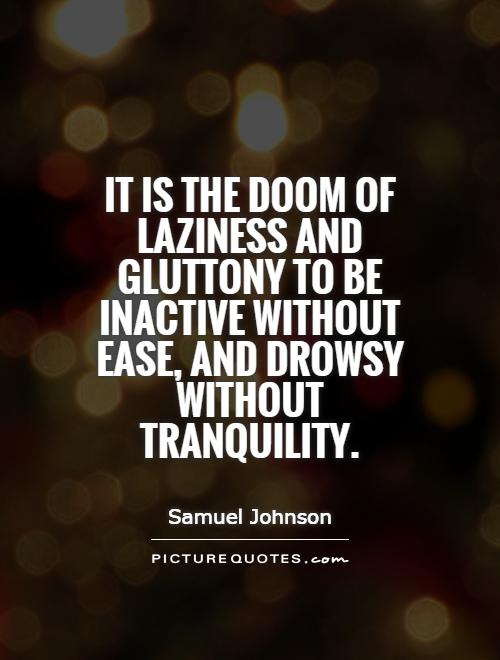It is the doom of laziness and gluttony to be inactive without ease, and drowsy without tranquility

It is the doom of laziness and gluttony to be inactive without ease, and drowsy without tranquility
Samuel Johnson, the renowned English writer and moralist, was a firm believer in the idea that laziness and gluttony were detrimental to one's well-being. In his famous work, "The Rambler," Johnson explores the consequences of these vices, arguing that they lead to a life of inactivity and restlessness.Johnson believed that laziness and gluttony were closely intertwined, as both vices stem from a lack of self-discipline and a desire for instant gratification. He saw laziness as a form of spiritual sloth, a refusal to engage with the world and fulfill one's potential. Gluttony, on the other hand, was a physical manifestation of this spiritual laziness, a constant craving for excess and indulgence.
According to Johnson, the doom of laziness and gluttony was twofold. Firstly, those who succumbed to these vices would find themselves inactive without ease. In other words, they would be trapped in a cycle of procrastination and avoidance, never fully engaging with the tasks and challenges that life presented to them. This lack of productivity would ultimately lead to feelings of dissatisfaction and unfulfillment.
Secondly, Johnson believed that laziness and gluttony would also make individuals drowsy without tranquility. This meant that even when they were not physically inactive, those who indulged in these vices would still be plagued by a sense of restlessness and unease. Their minds would be clouded by distractions and cravings, preventing them from experiencing true peace and contentment.












 Friendship Quotes
Friendship Quotes Love Quotes
Love Quotes Life Quotes
Life Quotes Funny Quotes
Funny Quotes Motivational Quotes
Motivational Quotes Inspirational Quotes
Inspirational Quotes